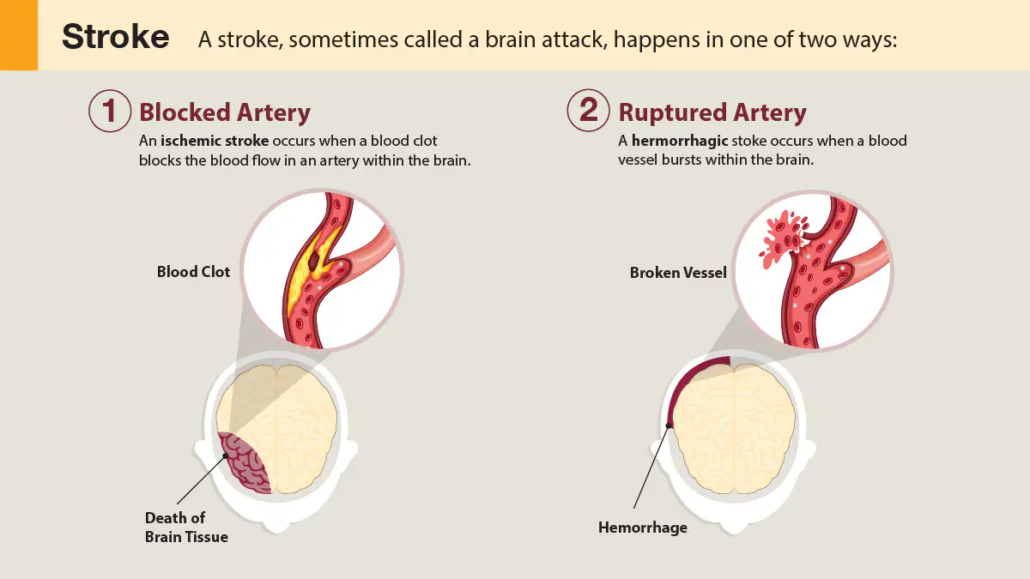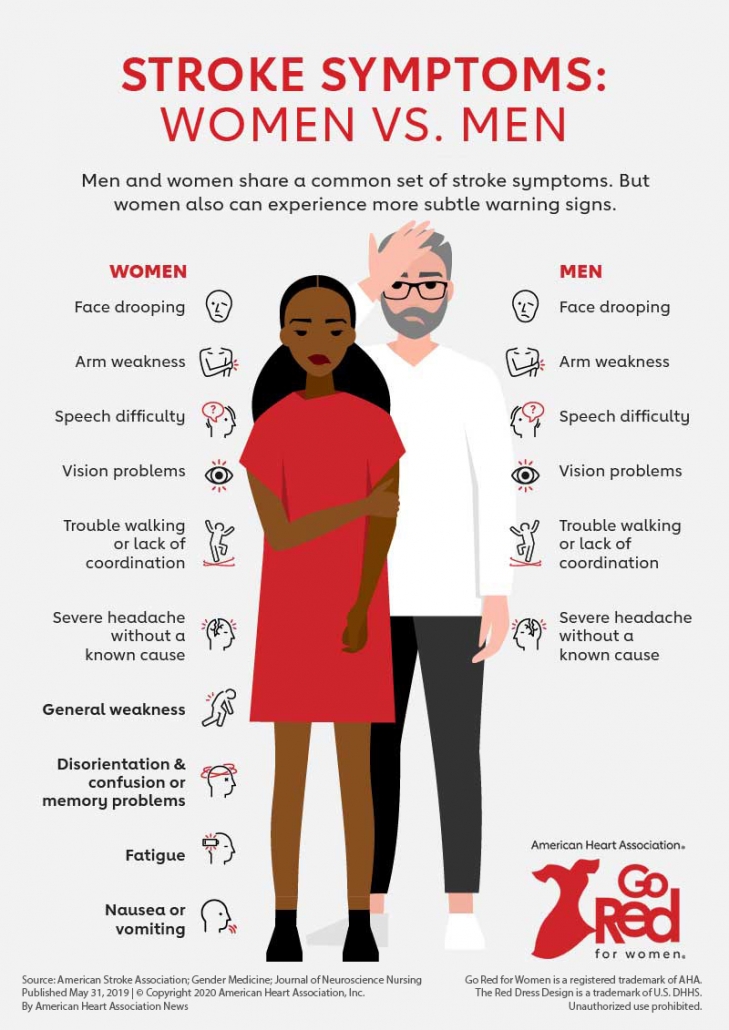“Stroke is a leading cause of death for women.
In the United States, 1 in 5 women
between the ages of 55 and 75 will have a stroke”.1
Umbrella
What may the Stroke Umbrella include?
Depending on the Source (DotS) this Umbrella may include:
- Brain Attack
- Brain Stroke
- Cardiovascular Disease
- Cerebral Hemorrhage
- Cerebral Infarction
- Cerebrovascular Accident (CVA)
- Hemorrhagic Stroke
- Ischemic Stroke
- Stroke
Definition
What is a stroke?
DotS the definition of a stroke may vary. The American Stroke Association’s (ASA) definition is:
Cause
What causes a stroke?
In Stroke: About Stroke – What It Is the (United States) Centers for Disease Control and Prevention (CDC) elaborate on:
In either case, parts of the brain become damaged or die. A stroke can cause lasting brain damage, long-term disability, or even death”.3
Risk Factors
What are risk factors for stroke?
In Stroke – Causes, Signs and Symptoms: Are You At Risk of Having A Stroke? the British Heart Foundation (BHF) elaborate on:
- …If you’re aged over 55…”.4
Atrial Fibrillation
Is atrial fibrillation (AF) a risk factor for stroke?
In Stroke – Causes, Signs and Symptoms: Are You At Risk of Having A Stroke? the BHF also note:
- “If you have a type of irregular heartbeat called atrial fibrillation (AF) – if you have AF, the top chambers of your heart (your atria) do not pump blood through your heart as well as they should. If the chambers are not emptied properly, this can lead to a blood clot forming within the chamber. If this happens, there’s a risk that it can travel to your brain and block the blood flow”.5
African American Women
Are African American women at higher risk for stroke?
In Stroke: About Women and Stroke – At-Risk Populations: Why Are African American Women At Higher Risk for Stroke? the CDC elaborate on:
- Almost 3 in 5 African American women are diagnosed with high blood pressure (greater than or equal to 130/80 mm Hg). This is a much higher proportion than White women (almost 2 in 5)…”.6
Common Symptoms
What are the most common symptoms of a stroke?
In Cardiovascular Diseases (CVDs): What Are Common Symptoms of Cardiovascular Disease? the World Health Organization elaborate on:
- Numbness of the face, arm, or leg, especially on one side of the body
- Confusion, difficulty speaking or understanding speech
- Difficulty seeing with one or both eyes
- Difficulty walking, dizziness, loss of balance or coordination
- Severe headache with no known cause; and
- Fainting or unconsciousness.
People experiencing these symptoms should seek medical care immediately”.7
Women’s Symptoms
What symptoms may women report that are different from the common symptoms?
In Symptoms of A Stroke In Women: How Do I Know If I’m Having A Stroke? Additional Stroke Symptoms That Might Be Seen In Women the American Heart Association’s Go Red for Women elaborate on:
Emergency Numbers
Can different countries have different emergency telephone numbers?
High Blood Pressure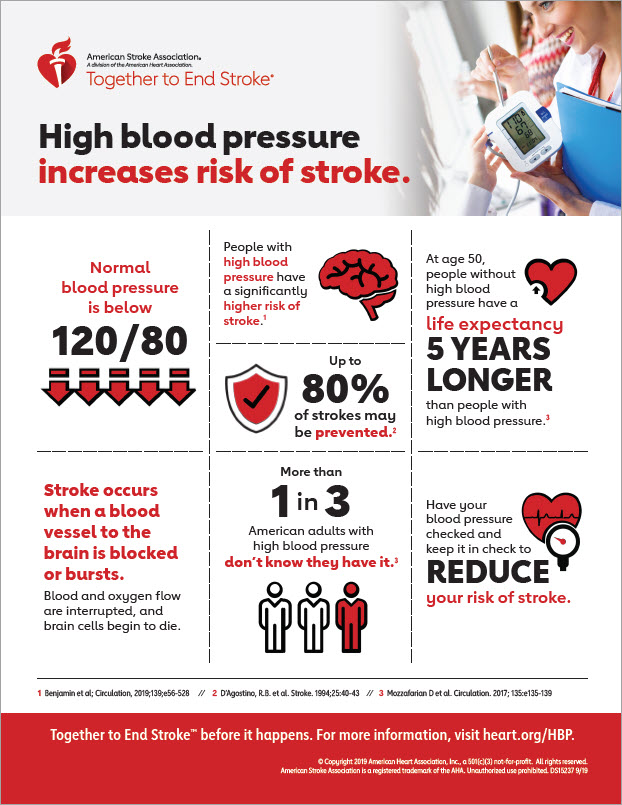
Is there an association between high blood pressure (HBP) and stroke?
In Risk Factors Under Your Control: High Blood Pressure the ASA note:
Common or Not
How common is stroke?
In the United States according to the the American Stroke Association in About Stroke:
Women
In women, how common is stroke?
In Stroke: About Women and Stroke – Overview the CDC elaborate on:
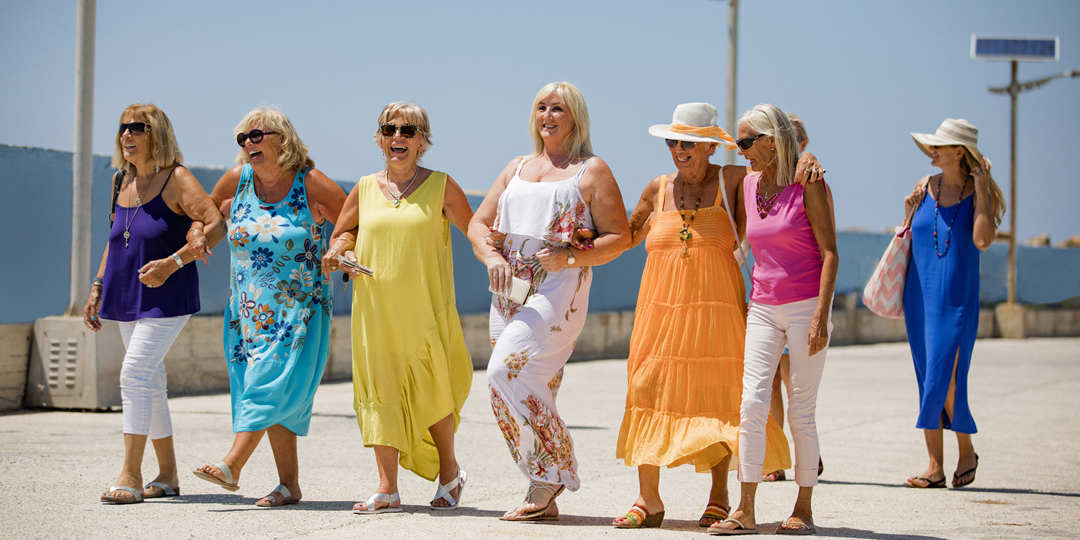 “Stroke is a leading cause of death for women.1 In the United States, 1 in 5 women between the ages of 55 and 75 will have a stroke.
“Stroke is a leading cause of death for women.1 In the United States, 1 in 5 women between the ages of 55 and 75 will have a stroke.
Surprised? You’re not alone. Many women do not know their risk of having a stroke”.11
Affect
How may a person be affected by stroke?
In Effects of Stroke the ASA explain:
WISEWOMAN
What is the (United States) WISEWOMAN program?
In WISEWOMAN: About WISEWOMAN – Overview the CDC elaborate on:
Health Care Provider
What if I think I am at risk of stroke or I have a family history of cardiovascular disease (CVD)?
If you think you are at risk of stroke or you have a family history of CVD, it may be in your best interest to choose to talk to your health care provider about this.
In Prevention of Diseases After Menopause: Cardiovascular Diseases the authors note:
Health Topics A-Z
Where may I find Health Topics A-Z related to Stroke?
In Health Topics A-Z you may find:
Links
Where may I find Links related to Stroke?
Your Country may have Links similar to:
Links
This Links List to third party websites is neither comprehensive nor exhaustive. Inclusion on this Links List does not imply endorsement or recommendation. Non-inclusion on this Links List does not imply non-endorsement or non-recommendation. Third party websites are not under the control of Meno Martha International Menopause Directory. Third party websites may contain explicit medical images and/or sexual references. Please read Meno Martha International Menopause Directory’s Links Policy before proceeding to a Link. Please contact Webmaster if you experience a problem with a Link.New or Updated
- 2024 Guideline for the Primary Prevention of Stroke: A Guideline From the American Heart Association/American Stroke Association [21 October 2024]
- About Women and Stroke [15 May 2024]
- Mayo Clinic Q and A: 5 Things To Know About Stroke [17 February 2025]
- Stroke: About Stroke [15 May 2024]
- Video: The 4 Phases of Stroke Care — Starting With Prevention
- Webinars: Previous – Recommendations on Cardiovascular Risk Assessment [19 November 2024]
- 2024 Guideline for the Primary Prevention of Stroke: A Guideline From the American Heart Association/American Stroke Association
- 5 Things To Know About Stroke
- 7 Things To Know About How Stroke Is Different for Women
- 7 Things You Can Do To Prevent A Stroke
- A Mayo Clinic Expert Explains Aphasia
- About Stroke
- American Stroke Association
- American Stroke Month [May]
- Aphasia and Stroke
- Ask Your Doctor How You Can Reduce Your Risk
- Atherosclerosis and Stroke
- Brain Basics: Preventing Stroke
- Cardiovascular Diseases (CVDs)
- Cardiovascular Disease
- Consumer Video and Podcast Series: 2023 Consumer Videos and Podcasts – NAMS 2023 Nonhormone Therapies Position Statement for Bothersome Menopause Symptoms
- Consumer Video and Podcast Series: 2023 Consumer Videos and Podcasts – New FDA-Approved Nonhormone Option for the Treatment of Hot Flashes
- Division for Heart Disease and Stroke Prevention [Centers for Disease Control and Prevention, United States]
- Doing These 8 Things May Greatly Lower Risk for Heart Disease and Stroke
- Effects of Stroke
- Empoweredtoserve.org [EmPOWERED To Serve]
- Goredforwomen.org [Go Red for Women]
- Healthy Lifestyle
- Heart Attack and Stroke Symptoms: Warnings Signs of Heart Attack, Stroke & Cardiac Arrest
- Heart Disease and Stroke
- High Blood Pressure
- High Blood Pressure and Stroke
- High Blood Pressure and Women
- Hypertension
- Know Stroke. Know the Signs. Act In Time.
- Know Your Numbers They Could Just Save Your Life
- Know Your Risk
- Learn More Stroke Warning Signs and Symptoms
- Life’s Essential 8
- May Is High Blood Pressure Education Month
- Mayo Clinic Minute: How To Reduce Your Stroke Risk [+ Video Courtesy: Mayo Clinic News Network]
- Mayo Clinic Minute: Managing Atrial Fibrillation? [+ Video]
- Mayo Clinic Minute: Poor Sleep Can Be Linked To Stroke [+ Video Courtesy: Mayo Clinic News Network]
- Mayo Clinic Minute: Preventing Stroke [+ Video Courtesy: Mayo Clinic News Network]
- Mayo Clinic Minute: Stroke Treatment [+ Video Courtesy: Mayo Clinic News Network]
- Mayo Clinic Minute: Think ‘FAST’ To Recognize A Stroke [+ Video Courtesy: Mayo Clinic News Network]
- Mayo Clinic Minute: What Is A Subarachnoid Hemorrhage? [+ Video]?
- Mayo Clinic Minute: What Women Need To Know About Stroke [+ Video Courtesy: Mayo Clinic News Network]
- Mayo Clinic Q and A: 5 Things To Know About Stroke
- Menopause Preparedness Toolkit Video Series: Common Conditions Associated With Menopause and Midlife
- Millionhearts.hhs.gov
- Mindyourrisks.nih.gov [Mind Your Risks]
- National Center for Complementary and Integrative Health: Cardiovascular Disease
- National Institute of Neurological Disorders and Stroke: All Disorders
- Recovery After Stroke
- Recovering From A Stroke
- Reduce Your Risk of Stroke
- Risk Factors
- Risk Factors Under Your Control
- Stroke
- Stroke
- Stroke
- Stroke
- Stroke
- Stroke
- Stroke
- Stroke Information In Other Languages
- Stroke Prevention
- Stroke Risk Factors
- Stroke Symptoms: F A S T
- Stroke and Women
- Stroke – Causes, Signs and Symptoms
- Stroke – Causes, Signs and Symptoms: What Is A Stroke [+ Video]
- Stroke – Multiply Languages
- Stroke.org [National Stroke Association, United States]
- Stroke.org.uk [Stroke Association, United Kingdom]
- Stroke: About Stroke
- Stroke: About Women and Stroke
- Stroke: Preventing Stroke
- Stroke: Stroke Risk Factors
- Stroke: Signs and Symptoms
- Stroke: What Is A Stroke?
- Strokefoundation.org.au [Stroke Foundation, Australia]
- Strokes and Brain Health Infographic
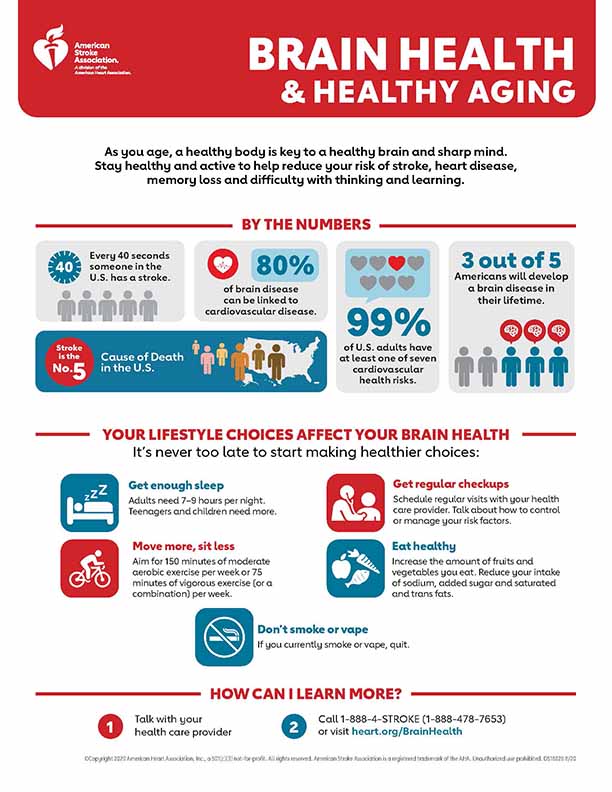
- TIA (Transient Ischemic Attack)
- The Women’s Health Initiative Randomized Trials and Clinical Practice
- Types of Stroke and Treatment
- Videos & Podcasts: Videos – Cardiovascular Disease In Women
- Video: The 4 Phases of Stroke Care — Starting With Prevention
- Wisewoman [United States]
- Watch, Learn and Live: Hemorrhagic Stroke
- Watch, Learn and Live: Ischemic Stroke
- Watch, Learn and Live: Transient Ischemic Attack
- Webinars: Previous – Hormones and Stroke: An Update on Treatment and Risk
- Webinars: Previous – Recommendations on Cardiovascular Risk Assessment
- What Are the Differences In Left vs. Right Brain Strokes?
- What Is A Stroke?
- What Is A Stroke? [Multiply Languages]
- Women and CVD
- Women and Risk of Stroke Infographic
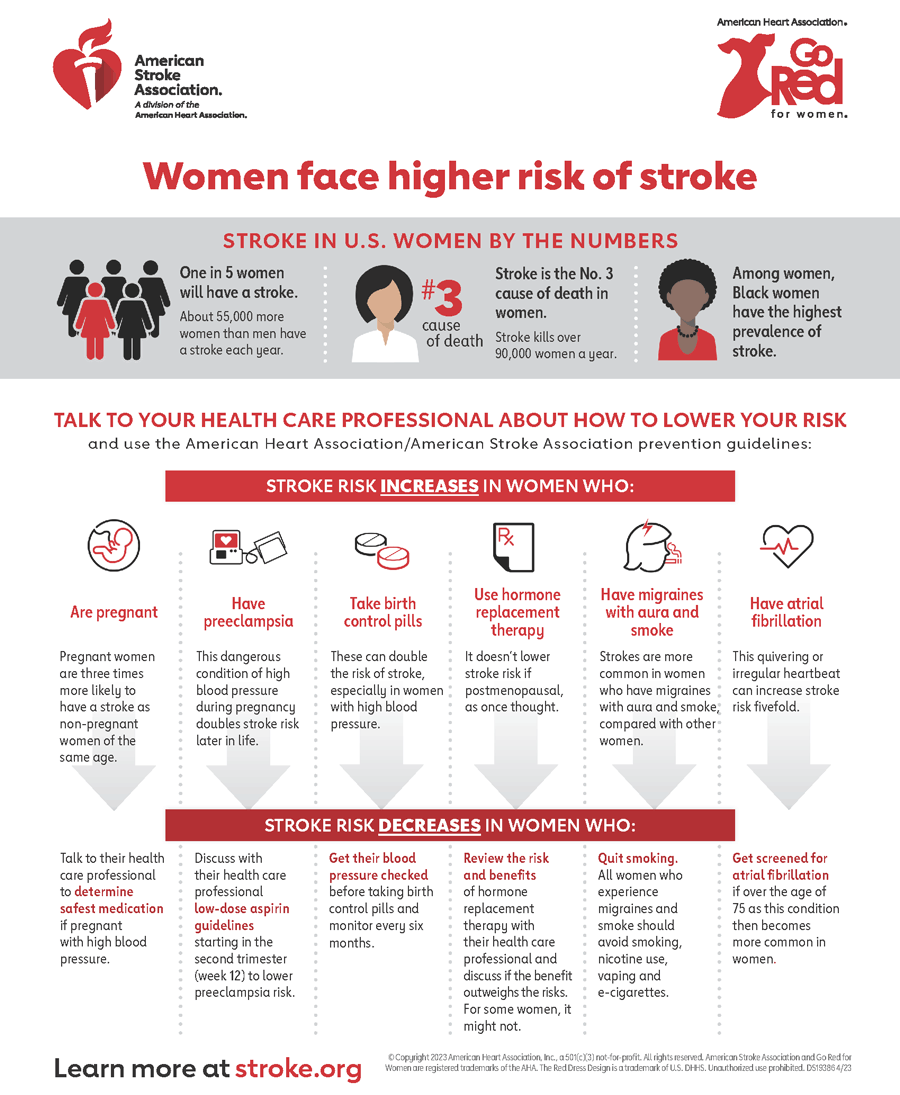
- Women and Stroke
- World Heart Day [29 September]
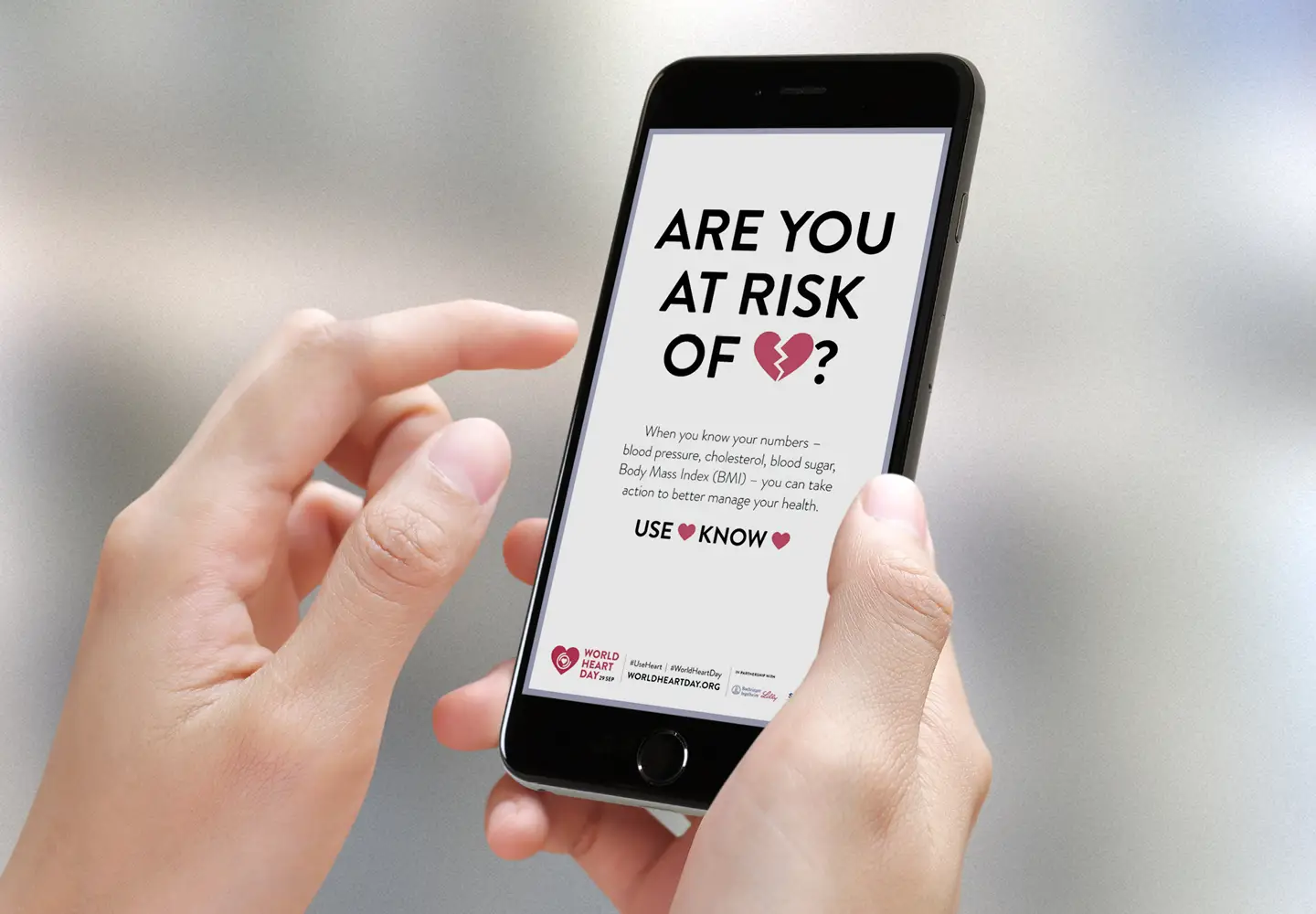
- World Menopause Day [18 October 2023]

- World Stroke Day [29 October 2024]

- World-stroke.org [World Stroke Organization]
- Yourethecure.org [You’re the Cure, American Heart Association]
Sources
Where may I find the Sources quoted?
You may find the Sources quoted at:
Sources
- Stroke: About Women and Stroke – Overview. 15 May 2024. Centers for Disease Control and Prevention https://www.cdc.gov/stroke/about/women-and-stroke.html Accessed: 27 December 2024
- About Stroke: What Is Stroke? American Stroke Association https://www.stroke.org/en/about-stroke Accessed: 27 December 2024
- Stroke: About Stroke – What It Is. 15 May 2024. Centers for Disease Control and Prevention https://www.cdc.gov/stroke/about/ Accessed: 27 December 2024
- Stroke – Causes, Signs and Symptoms: Are You At Risk of Having A Stroke? Page Last Reviewed: February 2024. British Heart Foundation https://www.bhf.org.uk/informationsupport/conditions/stroke#risk Accessed: 27 December 2024
- Stroke – Causes, Signs and Symptoms: Are You At Risk of Having A Stroke? Page Last Reviewed: February 2024. British Heart Foundation https://www.bhf.org.uk/informationsupport/conditions/stroke#risk Accessed: 27 December 2024
- Stroke: About Women and Stroke – At-Risk Populations: Why Are African American Women At Higher Risk for Stroke? 15 May 2024. Centers for Disease Control and Prevention https://www.cdc.gov/stroke/about/women-and-stroke.html Accessed: 27 December 2024
- Cardiovascular Diseases (CVD): What Are Common Symptoms of Cardiovascular Disease? 11 June 2021. World Health Organization https://www.who.int/en/news-room/fact-sheets/detail/cardiovascular-diseases-(cvds) Accessed: 27 December 2024
- Symptoms of A Stroke In Women: How Do I Know If I’m Having A Stroke? Additional Stroke Symptoms That Might Be Seen In Women. Last Reviewed: 31 January 2024. American Stroke Association https://www.goredforwomen.org/en/about-heart-disease-in-women/signs-and-symptoms-in-women/symptoms-of-a-stroke Accessed: 27 December 2024
- Risk Factors Under Your Control: High Blood Pressure. Last Reviewed: 08 October 2023. American Stroke Association https://www.stroke.org/en/about-stroke/stroke-risk-factors/risk-factors-under-your-control Accessed: 27 December 2024
- About Stroke. American Stroke Association https://www.stroke.org/en/about-stroke Accessed: 27 December 2024
- Stroke: About Women and Stroke – Overview. 15 May 2024. Centers for Disease Control and Prevention https://www.cdc.gov/stroke/about/women-and-stroke.html Accessed: 27 December 2024
- Effects of Stroke. American Stroke Association https://www.stroke.org/en/about-stroke/effects-of-stroke Accessed: 27 December 2024
- WISEWOMAN: About WISEWOMAN – Overview. 15 May 2024. Centers for Disease Control and Prevention https://www.cdc.gov/wisewoman/index.htm Accessed: 27 December 2024
- Lobo, R. A., Davis, S. R., De Villiers, T. J., Gompel, A., Henderson, V. W., Hodis, H. N., Lumsden, M. A., Mack, W. J., Shapiro, S. and Baber, R. J. Prevention of Diseases After Menopause: Cardiovascular Diseases. 2014:7 https://www.imsociety.org/wp-content/uploads/2020/07/wmd-2014-white-pages-english.pdf Accessed: 27 December 2024


